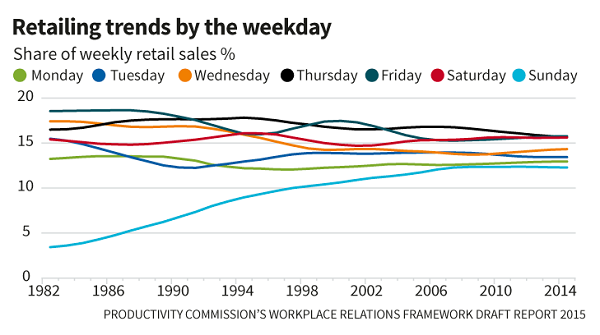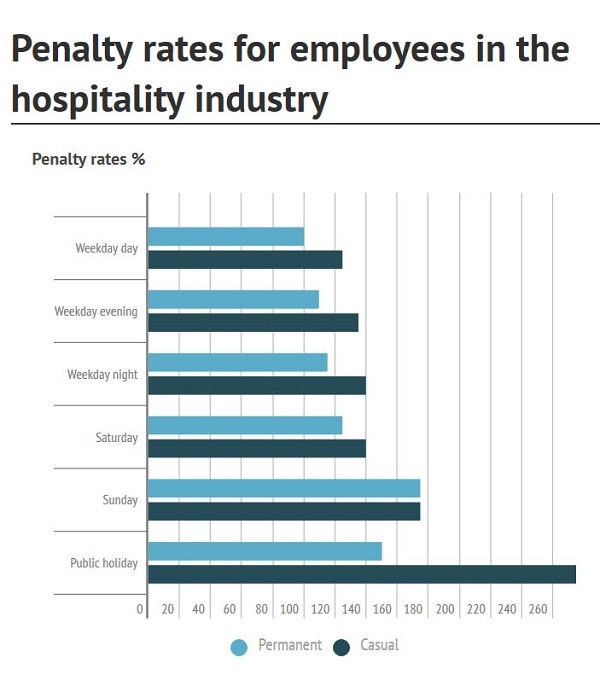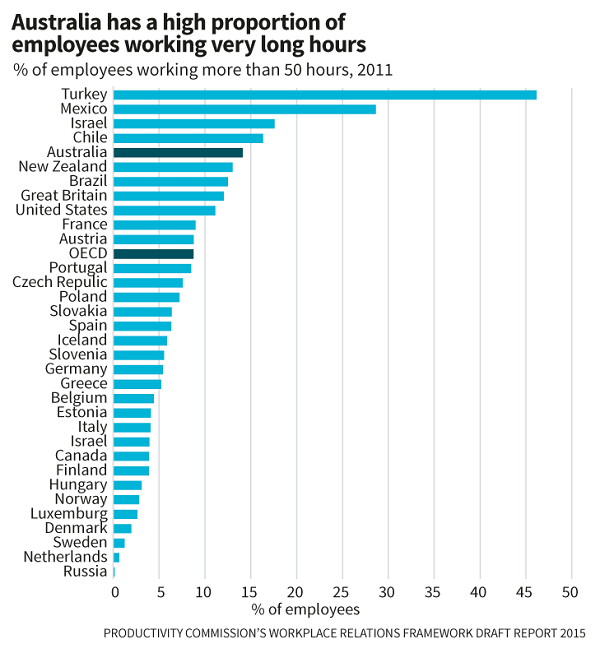Almost everything conservative commentators say about the industrial relations system is wrong, says Peter Martin. It works well, it isn’t creating wages explosions, and it isn’t pricing people out of work.
What do the conservatives think about Sunday penalty rates? Mark Kenny explains:
- Economists, politicians, the Productivity Commission, and peak employer groups – all say the higher labour unit costs of operating a business on a Sunday can be make-or-break as to whether to trade at all that day.
Thing is, there is no evidence to support this contention, a fact confirmed by Professor Ray Markey, Director of the Centre for Workforce Futures.
Of course, there is no evidence for the contrary case either, but so convinced is the Productivity Commission that they believe the onus of proof should be reversed:
- The one new argument in the report is very interesting, namely that the onus of proof about the impact of reduced penalty rates on employment should be reversed i.e. employers shouldn’t have to prove this is the case to get changes – clearly an admission of a lack of evidence.
The politics of penalty rates and industrial relations in general is tricky according to Mark Kenny. Coalition voters appear to favour keeping penalty rates. Turnbull doesn’t want the issue to become a factor in the next election. Employers, of course, are baying for greater, braver ‘reforms’, to restore the privileges they had under Work Choices and more. Turnbull’s current stance, enunciated by Michaela Cash, is that the Fair Work Commission will decide.
The Productivity Commission’s view is that the Fair Work Commission is not well placed to decide the matter. It is a judicial body which deliberates on the evidence presented. They have suggested a Workplace Standards Commission with responsibility for reviewing and varying the minimum wage and modern awards. This would be a non-judicial body, capable of undertaking its own inquiries and paying for independent analysis.
Such a body could overcome the criticism of a lack of evidence. Almost inevitably, however, it would be stacked with believers in reducing Sunday penalty rates. If Turnbull forgoes this opportunity then he will be shown to be truly chicken-hearted on industrial relations.
Peter Martin tells us the Sunday rates are often 150 to 200 per cent of weekday rates, compared to Saturdays, where the rates are nearer to 125 per cent.
- But weekends are changing. Traditionally a time for socialising, there’s now less of it and it is highly likely to be done while shopping. In one survey, 39 per cent of Australians nominated their shopping centre as their most important meeting place. Only 16 per cent nominated a park, and 19 per cent nominated a pub. For some stores, Sunday has become their most important trading day, accounting for 25 per cent of all sales.
The Productivity Commission favours the Sunday rate being brought into line with the Saturday rate for the leisure industries of hospitality, entertainment, retailing, and dining.
Martin’s main point, though, is that the Productivity Commission’s report was about the industrial relations system in general. It was asked by the former Abbott government to review Australia’s workplace relations framework to see what effect it was having on levels of unemployment, productivity, and competitiveness. In general it found the system in pretty good shape.
Gareth Hutchens has an explainer on the report.
In retailing generally Sunday is almost like any other day:

Here are the penalty rates for the retail industry:

On minimum wages:
- It says Australia’s minimum wage should not be abolished.
It says minimum wages are likely to have a zero “or even positive” effect on jobs so long as they are not set too high.
It says there is no agreed estimate of the number of adult Australians paid at the hourly minimum wage rate, but previous estimates range between 4 and 11 per cent of employees who are paid up to or close to the national minimum rate.
This upset the conservatives. Youth wages are apparently low by international standards.
Another feature of our system is that many of us work long hours:



There are a number of separate issues here:
Firstly, part of what is going on is the obscene idea that poor coffee shop workers should be paid less so that the latte set have cheaper coffee on Sundays.
Then there is the stupid idea that the poorly paid should be even more poorly paid. Stupid, stupid , stupid in a country that needs stimulus to get the economy going again. Rudd did the smart thing with the GFC by diverting money to the poor instead of the tax cuts to the rich that Turnbull wanted. Right now, it is important that any changes to penalty rates are offset by increases in base rates.
Then there are the various penalty rates them selves. Some penalty rates make sense for at least fairness reasons. Think penalties for things like night shift, casual work, split shifts, short shifts etc.
I wanted to weigh into this one because I have been at both ends of the chain. But the more I looked at it the more complicated it became.
What I did conclude quite easily is that the expression “Penalty rates” is not really appropriate because to me it implies wrong-doing. “[Justice (1909)] Higgins awarded the penalty rates, firstly
as compensation to employees being made to
work at inconvenient times, but secondly to act as
a deterrent against ‘long or abnormal hours being
used by employers’” I don’t know if Higgins had Sunday Worship in mind, but if he did, that part of his judgement might now be arguable. So I will maintain that penalty rates are not properly named and suggest the name adds prejudice to the discussion.
Noting the complexity of the argument I sought some history via Google. I am a bit time poor atm because of family works, but I found this article at least a good starting point:
http://mckellinstitute.org.au/wp-content/uploads/pdf/McKell_Penalty_Rates.pdf
Hopefully I can get to it soon enough.
John D makes good points above but I’m keen to dig deeper.
Carrying on from my comments above I do think there are some penalty rates that should be cut or removed provided that the effect of these cuts are balanced by increases in base rates – Definitely not used to reduce the total wages bill.) (Someone who works a 5 day week including Sat (1.5 times) and Sun (2 times) earns about 30% more that someone who works 5 days Mon to Fri – So we are talking about a 30% increase in base rate to offset the loss of these penalty rates.)
The first of these is weekend penalty rates. I have a long term belief that most of us would be better if we switched to a 7 day week roster where the base working week averaged 3.5 days/week with no penalty rates attached to any day of the week (Except public holidays?). Advantages include better use of both production and recreational resources, dramatic reduction in congestion and a better sharing of the available work.
Ditto overtime penalties. The unions claim that overtime penalties encourage employers to employ more people so that hours per employee can be reduced. My observation is the direct opposite. Penalty rates make overtime a more important part of the pay packet so, where they can, unions oppose anything that is going to reduce overtime. Makes it harder to use work sharing as part of the strategy for reducing unemployment. In addition, overtime penalty rates increase the impact of cutbacks in hours which can make it hard for families that have got used to high overtime levels.
Both weekend and overtime penalties to the growing inequality. Penalty rates make an important contribution to growing inequality.
We need to have a sensible conversation about what penalty rates should be changed and what other changes need to be made to compensate for changes.
Interesting link GH. It seems to be assuming that penalty rates will be cut without compensating changes to base rates.
If over 15% of Australians are working over 50 hrs per week and unemployment is around 5% there does seem to be a case for having a serious look at work sharing.
Ok, where to start….
No, the coffee is priced the same all week. If you’re asked to pay 50% to 200% more for your coffee during ” unsociable hours ” would you ? It’s not an ” obscene idea ” it’s a nonexistent premise.
And why, for the love of Ted Mulry, is the Productivity Commission considering anything other that pure economics relating to commerce ?
What fool made ” feelings ” and ” social cost ” something the PC can even quantify, leave alone incorporate into its modelling ? Such arbitrary ” values ” can only be applied by individual and vary dramatically.
Geoff is correct to say it’s complicated, see here to find out how so.
I’m not personally engaged enough to spend a lot of time investigating this one, but I suspect in the long term Saturdays and Sundays will be regarded as the same, as will most public holidays. The holidays that are exceptional are Christmas and Easter, especially Christmas. Anyone who has to work over Christmas deserved special consideration.
Jumpy: Life has certainly got easier with all those fair work calculators in your link.
I find it a bit strange though that you think productivity should be all about
Some of us in our ignorance think that productivity includes things like motivation, how people feel and the strains of struggling to live without enough money.
Also found it a bit strange that a business person would think that the price of a cup of coffee is 100% labour cost.
It doesn’t, noone on double time is twice as productive.
It isn’t and I don’t.
I find it a bit strange that people don’t realise labour is the dominant cost in most small businesses and think that all a coffee shop employee is payed to do is make coffee.
In reality, on a normal day (* say the shop sells 100 coffees for an easy calculation),the first 65 pay for wages, the 5 for electricity, 5 insurance, 10 rent, 5 for beans, 5 maintenance and sundry.
The last 5 cups are profit if nothing goes wrong and the tax man take 1.5 of them.
What if it sells only 90 cups ?
What if Billy or Sally chuck a sicky?
What if wages double when your sales don’t?
Most of we small businesses walk this tightrope constantly.
Give it a try if you dare.
( * not exact percentages but you get the idea )
Jumpy: Small business’s do worse when the income of their customers drops. If you take a narrow view, the coffee shop business could cut wages without affecting their business because their workers are too poorly paid to be customers. However, thinking a bit more broadly, the business of some of their customers includes purchases from people who only earn coffee shop wages.
As a general comment I have never worked for anyone who put on extra people just because wages dropped.
John you say: ” … I have never worked for anyone who put on extra people just because wages dropped.”
The other half of that is that people are not hired because of the high cost.
John I don’t think Jumpy’s link reduced the complexity. It would be a brave person to navigate that site and succeed in getting it all right. Typically you would use your industry association of ask a consultant to try and protect you from later litigation.
I think Brian is right, the difference between Saturday and Sunday will reduce. Will that have an overall benefit for the economy? You would hope so. Enterprise capital does not just “appear”, it has to be coaxed out of investors by the prospect of profit. If leveling of penalty rates improves the chance of investment that is good as long as the opportunity is taken up.
Big business has more choice and can invest overseas quite readily and indeed they do. Small business is usually limited to local labour conditions and should respond positively to reduced disincentives to hire.
In my decades as an entrepreneur, perhaps the greatest reason for not hiring was the difficulty of letting employees go. Mostly it was not an issue but actually off-loading a poorly performing employee was unreasonably hard. The laws were introduced for good reason – to stop workers from being abused. But the unintended consequence was to reduce the will to employ more people. A bit like pay roll tax tended to limit the size of companies. I guess I could go on here but my point is that over time the disincentives to hire have built up incrementally to where we are now, a general unwillingness to hire. Changing penalty rates will have some effect but there are a slew of other changes that could be considered as well.
John
By that logic if we triple the minimum wage and double time for anything over 10 hours then Businesses will boom.
Yeah,na.
What will that do to the cost of a cup of coffee ?
Will turnover increase proportionately to cover the increased input cost ?
Of course not.
As a general comment you will never see a business put on more people when thin profit margins get thinner due to higher input costs, wages being the biggest.
Lots of things increase productivity but increased wages is not one of them.
Increased wages occur after a period of increased productivity coupled with stronger profits enabling opportunity to expand.
Sorry Geoff, stopped to eat halfway through my comment a didn’t see yours.
You are quite correct in all you said.
The entertainment sector has been increasing relative to other sectors of the economy. That suggests at a macro level that competition would be working to keep profit margins down in a sector where there are relatively low barriers to entry. Just a thought.
For this sector I would have thought that the market power of property managers and owners of retail centres might be a bigger problem limiting employment given the level of economic power that they exercise and the level of rents that they can and do extract from small retailers.
The other question I have relates again to the macro setting – there are limits to the absolute amount of spending on consumption items – particularly in a setting where wage growth is low – I acknowledge there is a degree of flexibility in the spread of spending across discretionary items but there are some limits
GH: You say:
The point I would make is that coffee shops are not a new business that needs coaxing. It is a booming business 7 days a week despite the penalty rates.
I would also make the point that it is grossly unfair to push down the earnings of the poorly paid just in case this might encourage “enterprise capital” to invest.
Business’s invest when they see expanding market opportunities and new ideas. They are reluctant to invest when they see the economy contracting.
Not according to the hospitality employers I know, do you base this assertion on facts or a vibe ?
You will need about $350,000 to open a Gloria Jean’s franchise,, would you encourage any of your family to shell that much in the hope of profiting one day ?
Of course Karen would label that person a parasite but that aside if wages triple then everyone can buy their own coffee machine, problem solved, right?
I dunno JD. For example, using the coffee shop again, an industry that is apparently booming.
What is happening here is that the coffee shops are investing in better machines, automated roasters and higher quality coffee. (But note my aside on Grinders below) Where ever possible they substitute capital for labour, even though the market is booming. They might, just might engage a barista. Why are they doing this? Well they seek a profit of course and they are defending them selves against an increasingly diluted market (perhaps) or noticing that there has been a notable change in the premium coffee market and they must keep up. You could say that their economy is at risk of contracting so they are actively investing capital to survive. Most enterprises need to keep investing over time to embrace new technology in order to survive, even in a contracting economy.
Just as an aside, notice the Grinders brand? That’s Coca Cola taking a huge chunk of the market. I was told if you sell their coffee the machine(s) is/are free.
BTW, are coffee workers so poorly paid?
yeah, too many 0s, delete one please.
ta….
[I’ve made that $350K. Hope that’s right! – Brian]
I should disclaim, at this point, my Wife worked in cafes and restaurants for 15 years.
She was very good apparently and negotiated her wage rate to a healthy level.
The hospitality industry must be the most fluid in terms of staff turnover of all the sectors we have I recon ( no, I don’t have stats to back that up )